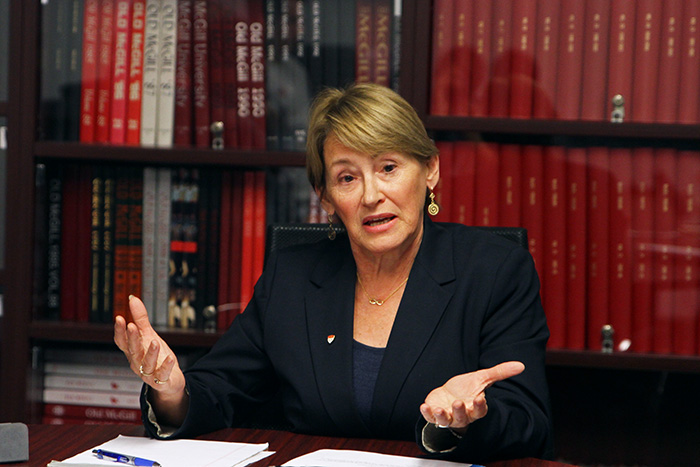On Oct. 4, Principal and Vice-Chancellor of McGill University Suzanne Fortier, and Deputy Provost (Student Life & Learning) Ollivier Dyens, met with members of the student media for a question and answer session. Topics covered during the roundtable included sustainability at McGill, the implementation of the policy against sexual violence, and the importance of student voices on campus.
In addition, Fortier and Dyens spoke briefly about the future plans for the Royal Victoria Hospital site (RVH). Although the decision to develop the site has not been finalized, Fortier stated that the space would be dedicated to sustainability.
“We haven’t made the decision yet [because] we need to do the feasibility study, but if [RVH] is developed, it will be around the theme of sustainability,” Fortier said. “That’s where we’ll have our school of public policy and great initiatives on sustainability. That, I think, is an important decision for our campus and one that I think is aligned also with what the community sees as important.”
Fortier acknowledged that while the administration may not see eye-to-eye with student activists who are proponents of divestment, McGill is still committed to investments in sustainability.
“We don’t agree on everything, as of course we all know that Divest McGill had a position on divestment,” Fortier said. “They themselves had said that it’s […] a symbolic political gesture. The [McGill Board of Governors]had a different opinion on [divestment]. The Board had an identical view, however, on the urgency and importance of taking actions towards increasing sustainability. There was no dissention on that front and the Board will be exercising stewardship on actions that we will take to decrease our footprint and increase our commitment to sustainability in all we do.”
According to Fortier, disagreement on complex issues such as divestment is to be expected, and even encouraged, on campus.
“I am not expecting, in particular on issues that are complex and issues that are political, that there will be a total [alignment] of views on our campus–in fact I would probably be worried if there were,” Fortier said. “In a democratic society or community, there are differences in opinion, always. What is important for us as an institution is making sure that different opinions are expressed freely, without fear. Also, that different voices are respected and that people are able to hear one another and that as a community we can move forward in a positive and constructive way.”
The administration has been working on the release of the Draft Policy against Sexual Violence in recent weeks. Dyens stated that the university is in the process of hiring another employee to assist Bianca Tétrault, the current Liaison Officer (Harm Reduction) in promoting awareness of sexual assault on campus. Additionally, Dyens discussed plans to create a sexual assault office at 688 Sherbrooke in addition to hiring support staff.
“Will that be enough? You know, I think we’ll see in a year from now,” Dyens said. “We will need a lot of support […] because […] the education, awareness, [and prevention pillar of the policy] is something the whole community has to work on and I think there has been progress in the last few years. Are we where we want to be? No, not until we get rid of [sexual violence] on campus.”
Another plan for the current school year includes a change to mental health services on campus that will better accommodate students in crisis. Dyens stated that a new ‘step-care’ program was launched on Oct. 3 in order to decrease wait times for students.
“Not every student that comes to mental health, counselling, or health services needs to see a psychiatrist right away,” Dyens said. “So [the step-care approach] will be a process where students will be seen very quickly, assessed very quickly, and [delivered] services very quickly [….] The great majority of our students coming into mental health or counselling services just come once […] so for a lot of them we can act very quickly and address the problem [….] And for those who have more fundamental issues, then we will free up time from our psychiatrists who actually deal with these things.”
When asked about plans to better communicate with the student body, Fortier and Dyens stated that communication is a reoccurring problem faced by the administration.
“Communicating with students is never an easy thing to do,” Dyens said. “We are struggling with communication, period—faculty, students, staff, the outside community. We are still using email and I think that’s probably the first issue.”
Dyens explained that he is creating a student advisory group in order to better hear student voices on campus. Applications will be available on the McGill website later in the Fall semester.
“[The advisory group is] really to give us an idea of what is going on […],” Dyens said. “It is complicated [because] students hear voices, they hear bits and pieces, [and] sometimes we don’t tell students the exact [reasoning behind our decisions]. We talk with the Students’ Society of McGill University [(SSMU) and] Post-Graduate Students’ Society [(PGSS) …] but they themselves have issues communicating with the student body. I don’t have a perfect answer —it is a struggle.”
The principal also stated that while she makes an effort to spend time with students, the size of the student body inhibits the amount of conversation that can happen between the student body and the administration.
“Obviously, we have 40,000 students, so nobody can spend the time with each one,” Fortier said. “We try to [hear] what students are saying and to see what you are doing on campus. To [understand] what your life looks like on campus, what are the things you want to see, and so on. It is a large community and that critique [regarding communication] will always be there.”








